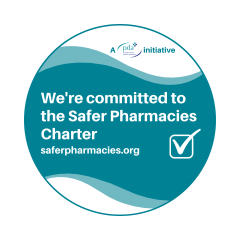Pharmacies displaying the Safer Pharmacies Charter sign
If you see a pharmacy displaying the safer pharmacies charter symbol then they are committing to meet the commitments that are detailed in the charter.

Prescribing of medicines is the most common clinical intervention made by doctors and over time, medicines have become increasingly complex and potent.
With each person being different, understanding the different types of medicines used, their effect, the dosages required and the interactions that some combinations of medicines may cause are an important part of any treatment. Whilst doctors are the experts in diagnosis, pharmacists are the experts in medicines and keeping patients safe is a key role of the community pharmacist.
This means that the conditions in which pharmacists work must enable them to focus upon the important role of checking that the medicines being supplied are safe to use by patients. Pharmacists have produced a Charter of seven commitments to help ensure safety for patients wherever pharmacists work.
The commitments in the charter should be standard practice whenever and wherever pharmacy work is carried out. We actively encourage other interested parties to endorse the charter and those who own or manage pharmacies to adopt the charter and ensure the commitments are fulfilled in their pharmacies.
Where pharmacists are directly involved in dispensing, or other processes requiring a high degree of accuracy, a suitably trained and competent member of staff will be readily available in the pharmacy at all times to provide an independent accuracy check.
When, in the most exceptional circumstances, no such second member of staff is present, the pharmacist must ensure adequate separation of the dispensing and final checking process.
Staffing levels will be sufficient to allow all legal, contractual and regulatory obligations to be met; to meet the workload involved in following standard operating procedures and to carry out other work in accordance with the organisations expectations. All staff must be suitably trained and competent to carry out the pharmacy work they are involved in.
A pharmacist is traditionally one of the few healthcare professionals accessible to patients without an appointment. A pharmacist must be available wherever patients expect immediate access to face-to-face expert advice on any medicines-related matters. The pharmacy owner or employer will meet this expectation by ensuring a pharmacist is available to patients and present in the pharmacy throughout its hours of operation.
Pharmacists must be able to take at least their statutory and contractual breaks and rest periods, and additional breaks as required to meet their professional obligations. Pharmacists will be enabled to take these without interruption and will not be placed under any direct or indirect pressure to forfeit.
Pharmacists will be enabled and encouraged to exercise professional decision-making in the workplace, so that patient safety and professional standards can be placed above any commercial or other operational considerations. Organisational and other targets must not inhibit professional autonomy.
Pharmacists will be able to raise concerns without reprisal or fear. This will be facilitated by a supportive, open and receptive organisational culture. Issues identified will be promptly addressed and robust and enduring solutions implemented without delay.
Pharmacists will not have to work in the pharmacy alone and will have access to the necessary support at all times to perform their roles. Risks will be assessed and preventive measures put in place so that patients and staff are safe and can feel safe. A zero-tolerance approach will be taken to violence or abuse of pharmacists and other pharmacy staff.
If you see a pharmacy displaying the safer pharmacies charter symbol then they are committing to meet the commitments that are detailed in the charter.

The PDA look after the interests of pharmacists and we proactively lobby for the pharmacists' agenda, which includes keeping patients safe.
We are the largest pharmacist organisation and only independent trade union exclusively for pharmacists in the UK.
The objective of this charter is to ensure improved safety and care for patients, through better working conditions in UK pharmacy practice.
The PDA undertake wider campaigning and activity to represent the interest of pharmacists and improve pharmacy.
You can email us at enquiries@the-pda.org